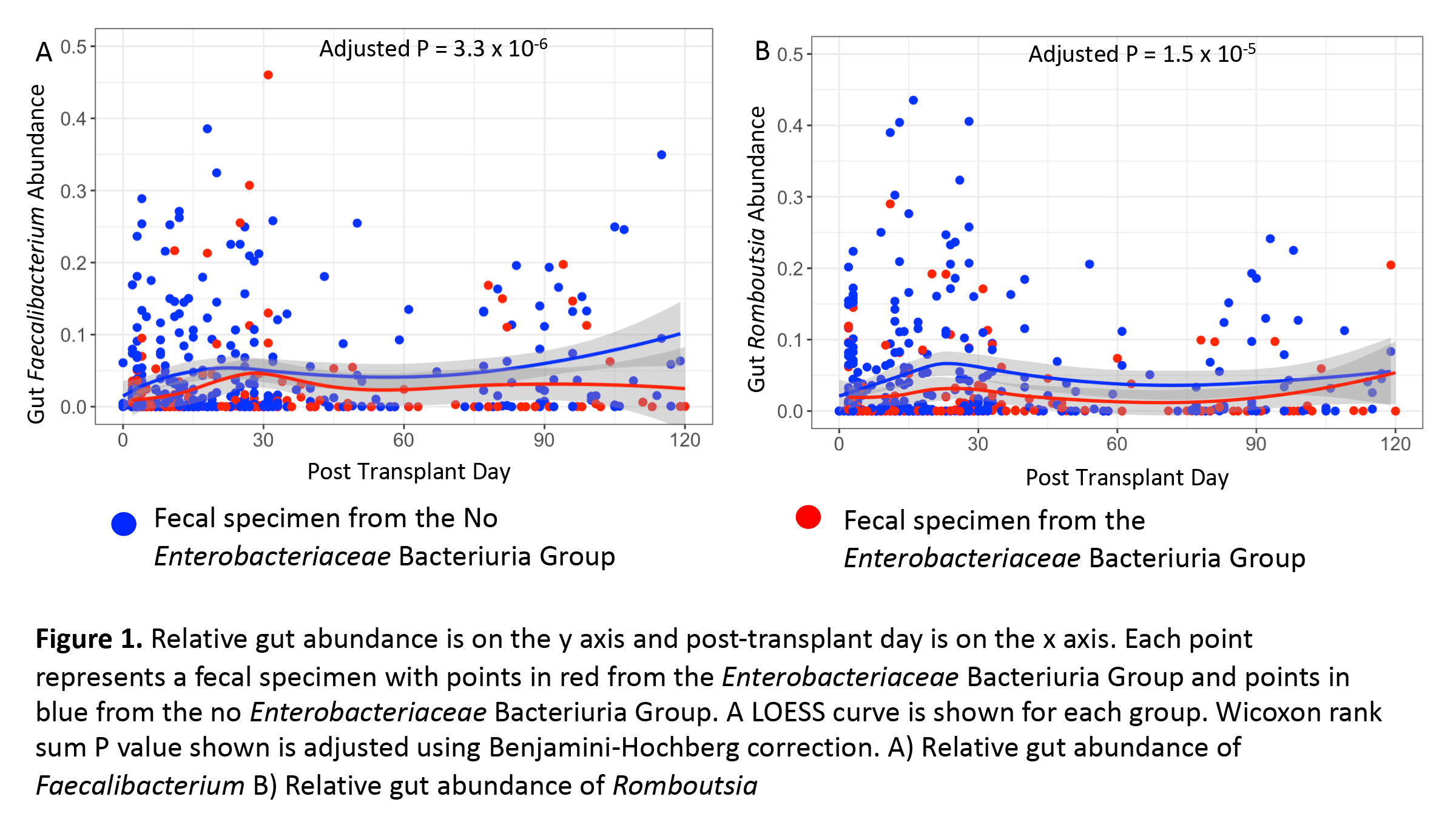Gut Commensal Microbiota are Associated with a Decreased Risk for Enterobacteriaceae Bacteriuria
J. R. Lee1, M. Magruder1, L. Zhang1, D. Dadhania1, E. Edusei1, S. Albakry1, M. Lubetzky1, E. Pamer2
1Medicine / Nephrology and Hypertension, Weill Cornell Medicine, New York, NY, 2University of Chicago, Chicago, IL
Meeting: 2020 American Transplant Congress
Abstract number: 275
Keywords: Bacterial infection
Session Information
Session Name: Kidney Infections Excluding Polyoma & Viral Hepatitis
Session Type: Oral Abstract Session
Date: Saturday, May 30, 2020
Session Time: 3:15pm-4:45pm
 Presentation Time: 4:03pm-4:15pm
Presentation Time: 4:03pm-4:15pm
Location: Virtual
*Purpose: Uropathogens from the gut is thought to be a source of bacteriuria and urinary tract infection, but the role of gut commensal microbiota in its development has not been previously explored. In this study, we examined whether the abundance of gut commensal bacteria is associated with a decreased risk for Enterobacteriaceae bacteriuria.
*Methods: We recruited 168 kidney transplant recipients who provided 510 fecal specimens in the first 3 months after transplantation and profiled their gut microbiota using 16S rRNA gene deep sequencing of V4-V5 hypervariable region. We compared the gut abundance of the 16 most abundant genera between kidney transplant recipients who developed Enterobacteriaceae bacteriuria in the first 6 months after transplantation (Enterobacteriaceae Bacteriuria Group) and kidney transplant recipients who did not develop Enterobacteriaceae bacteriuria (No Enterobacteriaceae Bacteriuria Group).
*Results: Among the cohort, 53 kidney transplant recipients developed Enterobacteriaceae bacteriuria. The relative abundances of Faecalibacterium and Romboutsia were significantly higher in the 353 fecal specimens from the No Enterobacteriaceae Bacteriuria Group than in the 157 fecal specimens in the Enterobacteriaceae Bacteriuria Group (Wilcoxon rank sum test, Benjamini-Hochberg adjusted p value < 0.0025) (Figure 1). The combined gut abundance of Faecalibacterium and Romboutsia was negatively correlated with gut Enterobacteriaceae abundance (Pearson ρ= -0.13, P = 0.003). In a time-dependent cox regression model, a top tertile cutoff of 13.8% for the combined gut abundance of Faecalibacterium and Romboutsia was associated with a decreased risk for Enterobacteriaceae bacteriuria development (HR 0.23, 95% CI: 0.08- 0.65, P= 0.006).
*Conclusions: The gut abundances of Faecalibacterium and Romboutsia are associated with less development of Enterobacteriaceae bacteriuria. Future studies investigating the utility of commensal bacteria as probiotics for preventing development of bacteriuria and urinary tract infections are warranted.
To cite this abstract in AMA style:
Lee JR, Magruder M, Zhang L, Dadhania D, Edusei E, Albakry S, Lubetzky M, Pamer E. Gut Commensal Microbiota are Associated with a Decreased Risk for Enterobacteriaceae Bacteriuria [abstract]. Am J Transplant. 2020; 20 (suppl 3). https://atcmeetingabstracts.com/abstract/gut-commensal-microbiota-are-associated-with-a-decreased-risk-for-enterobacteriaceae-bacteriuria/. Accessed March 1, 2026.« Back to 2020 American Transplant Congress

